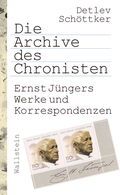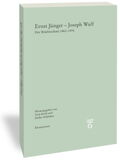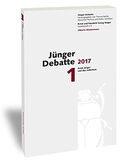
Correspondence and Afterlife. Ernst Jünger’s Letter Archive
Ernst Jünger (1895–1998) assembled a letter archive containing 130,000 documents, which he systematically organized and kept at his home in Wilflingen. Today it is part of his literary estate held at the German Literature Archive in Marbach and includes approximately 90,000 letters to him (from around 5000 correspondents) and some 40,000 letters by him preserved as transcriptions or copies. The letters are significant both to Jünger’s opus in terms of his literary production and its reception but also more broadly in terms of 20th-century literary and political history. They constitute a documentary basis for his autobiographical writings and diary chronicles, in which he often refers to his correspondence. Beyond their value in relation to Jünger’s work as an author, they are also important as historical sources given Jünger’s role as a writer and political player with close contacts to a variety of different people over many decades.
The project aims to publish a monograph based on a qualitative screening of the letter archive. The book will present Jünger’s postal activities, the conceptualization of the archive, as well as its meaning for his work and reception. In addition, selected letters – even some with relatively unknown correspondents – will be included in the volume in order to emphasize the value of these materials. The project hypothesizes that through his preemptive archival measures, Jünger became a representative of a new form of authorship: the author as archivist. With predecessors from as early as the late 18th century (Goethe being only one of the most prominent among them) who took heed of newly established literature archives, the archive-author does not merely write for his times and contemporaries, but also establishes the documentary foundations necessary for the engagement with his works that will first take place generations later.
Fig. above: Stamp from 1998 for the death of Ernst Jünger
see also
- Annotated Edition of the Correspondence between Ernst and Friedrich Georg Jünger (1908–1977) (Detlev Schöttker, Katja Schicht, project 2023–2025)
- Selected Correspondence Between Ernst and Gretha Jünger (1922–1960): Annotated Edition (Detlev Schöttker, Anja Keith, project 2020–2021)
Publications
Die Archive des Chronisten
Ernst Jüngers Werke und Korrespondenzen
With additional notes by Detlev Schöttker
Ernst Jünger: Das Abenteuerliche Herz
Zweite Fassung: Figuren und Capriccios
With additional notes by Detlev Schöttker. Print: 2nd edition (paperback), the e-book is based on the 1st edition of the 2013 print edition.
Ernst Jünger: An der Zeitmauer
Ernst Jünger – Joseph Wulf
Der Briefwechsel 1962–1974
Jünger Debatte
Band 1 (2017): Ernst Jünger und das Judentum
- Ein Forschungsprojekt zu Ernst Jüngers Briefarchiv. Detlev Schöttker im Gespräch, in: ZfL Blog, 15 Jun 2017
- Detlev Schöttker replies to Alexander Pschera, Chairman of the Ernst und Friedrich Georg Jünger Gesellschaft e.V. The interview was first published in April 2017 on the Website of the Ernst und Friedrich Jünger Gesellschaft e.V.
Events
Die Archive des Chronisten. Ernst Jüngers Werke und Korrespondenzen
Bad Saulgau
Anja Keith and Detlev Schöttker: Reading and talk: Ernst Jünger – Joseph Wulf. The Correspondence 1962–1974
Potsdam Museum, Am Alten Markt 9, 14467 Potsdam
Ernst Jünger – Joseph Wulf: Der Briefwechsel 1962–1974
Gedenk- und Bildungsstätte Haus der Wannsee-Konferenz, Am Großen Wannsee 56-58, 14109 Berlin
Detlev Schöttker: Ernst Jünger und Joseph Wulf. Ein Briefwechsel
NS-Dokumentationszentrum, Brienner Str. 34, 80333 München, Auditorium
Detlev Schöttker: Wer ist Otho? Zur Rolle Brasiliens in Ernst Jüngers »Marmorklippen«
Kloster Heiligkreuztal, Am Münster 7, 88499 Altheim-Heiligkreuztal
Detlev Schöttker: Die Ansichtskarten-Sammlung als Inspirationsquelle bei Walter Benjamin und Ernst Jünger
Kunsthistorisches Institut in Florenz, Max-Planck-Institut, Palazzo Grifoni Budini Gattai, Via dei Servi 51, 50122 Firenze (Italy)
Detlev Schöttker: Fakten und Fiktionen in Ernst Jüngers Tagebüchern
Tongji-Universität Shanghai (China)
Detlev Schöttker: Fortschritt als Katastrophe. Benjamins Jünger-Lektüren im Pariser Exil
Deutsches Seminar der Universität Basel, Nadelberg 4, Raum 3
Media Response
Review by Michael Martens, in: Frankfurter Allgemeine Zeitung 174 (30 Jul 2025), 10
Review by Ulrich Klappstein, in: literaturkritik.de, 25 Jul 2025
Review by Lothar Struck, in: Begleitschreiben, 18 Apr 2025
Review by Helmut Böttiger, in: Deutschlandfunk Kultur, program Lesart
Review chapter in: Götz Aly: Unser Nationalsozialismus. Reden in der deutschen Gegenwart, Frankfurt a.M.: S. Fischer 2023, 135–140
Review by Bruno Jahn, in: Germanistik – Internationales Referatenorgan mit bibliographischen Hinweisen 62 3–4 (May 2022), 1021–1022
Review by Aurélia Kalisky, in: H-Soz-Kult, 12 Apr 2021
Collective review by Wojciech Kunicki, in: Germanica Wratislaviensia 145 (2020): Vergangenheit und Zukunft, 276–285
Rezension von Matthias Schöning, in: Zeitschrift für deutsche Philologie 139.4 (2020), 632–635
Review by Holger Böning, in: Jahrbuch für Kommunikationsgeschichte 22 (2020), 202
Review by Peter Steinbach, in: Zeitschrift für Geschichtswissenschaft 6 (2020), 587–590
Radio review by Ruthard Stäblein, in: Deutschlandfunk, 24 Jan 2019
Review by Reinhard Mehring, in: Zeitschrift für Germanistik, New series XXX (2020), 252–253
Review by Götz Aly, in: Süddeutsche Zeitung, 18 Jan 2019
Review by Cord-Friedrich Berghahn, in: Zeitschrift für Germanistik, Neue Folge XXVIII (2018), Vol. 3, p. 683–687
Prepublication of an extract of Bantle/Pschera/Schöttker (ed.): Jünger Debatte Band 1 (2017): Ernst Jünger und das Judentum, in: Supplement Geisteswissenschaften, Frankfurter Allgemeine Zeitung, 11 Oct 2017




